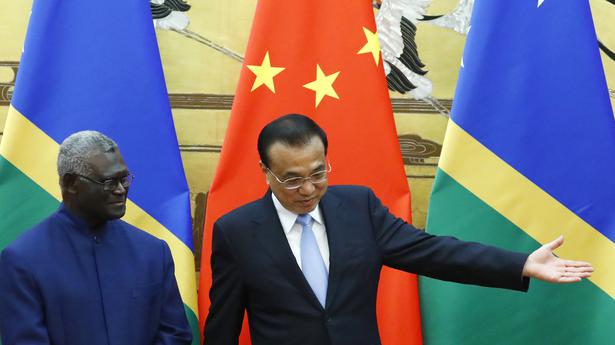
Red star over Solomon Islands
The Hindu
What is the controversy over the China-Solomon Islands security cooperation deal? What does it mean for geopolitics in the South Pacific?
The story so far: A recent leaked document has revealed that the Solomon Islands in the South Pacific has reached a deal with China which outlines an unprecedented level of security cooperation. This is the first deal of its kind for Beijing in the region. Honiara’s confirmation of the move has raised alarms in Washington and Canberra, which have extensive stakes in the South Pacific.
The document titled ‘Framework Agreement between the Government of the People’s Republic of China and the Government of Solomon Islands on Security Cooperation’ was leaked through social media on March 24. It created a huge controversy domestically as well as internationally because it has the potential to disturb the established security mechanisms in the South Pacific region. The document explicitly enables Beijing to send its “police, armed police, military personnel and other law enforcement and armed forces” to the islands on the latter government’s request, or if the former sees that the safety of its projects and personnel in the islands are at risk.
The document also provides for China’s naval vessels to utilise the islands for logistics support. There have been speculations in the wake of this revelation that China might be building its next overseas naval base in Solomon Islands after Djibouti, which was also incidentally referred to as a logistics support base.
Dismissing the prospects for any foreign military base, the government of Solomon Islands affirmed the finalisation of the draft of such a deal. The deal is not yet signed and it is not fully known whether the provisions mentioned in the leaked document are present in the final draft.
The Solomon Islands is part of the ethnically Melanesian group of islands in the Pacific and lies between Papua New Guinea and Vanuatu. The islands, which were initially controlled by the British Empire during the colonial era, went through the hands of Germany and Japan and then back to the U.K., after the Americans took over the islands from the Japanese during World War II.
The islands became independent in 1978 to become a constitutional monarchy under the British Crown, with a parliamentary system of government. Nevertheless, its inability to manage domestic ethnic conflicts led to close security relations with Australia, which is the traditional first responder to any crisis in the South Pacific. The Solomon Islands had cultivated strong ties with Taiwan, which ended with the emergence of the current government in Honiara.
In 2019, the new government headed by Prime Minister Manasseh Sogavare switched Taiwan for China. This was supposedly after Beijing offered half a billion U.S. dollars in financial aid, roughly five times what Taiwan spent on the islands in the past two decades. It has been alleged by the pro-Taiwan Opposition that the Sogavare government has been bribed by China. As the money from China flowed in, so did the adverse impact to the local population from Chinese businesses, Chinese labourers for Chinese infrastructure projects, as well as a perceived preferential treatment for Chinese interests by Honiara.











